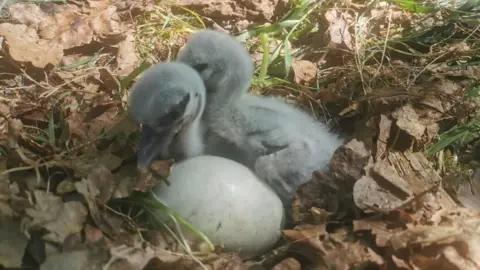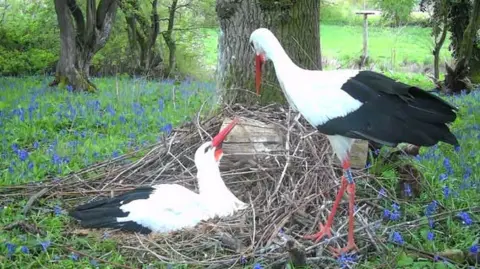Baby storks born at UK's first 'stork village'
 Laura Vaughan-Hirsch/White Stork Project
Laura Vaughan-Hirsch/White Stork ProjectAn estate south of Horsham, West Sussex, has become the UK's first 'European Stork Village' as 12 baby birds are born, according to biologist Laura Vaughan-Hirsch, leader of the White Stork Project.
The chicks are being raised in four ground nests, overseen by Knepp Wilding as part of the project.
The nests have been built by non-flying stork parents, who were injured in the wild, rescued by Warsaw Zoo and quarantined at Cotswold Wildlife Park and Gardens.
The babies are being "protected in a predator-proof but open-topped pen" where "the young will be free to fly free" and other storks can visit them, said the White Stork Project.
 Kevin Harwood/White Stork Project
Kevin Harwood/White Stork ProjectMs Vaughan-Hirsch, who leads the project for Knepp Wildland Foundation, says efforts began in 2016 as part of a wider stork reintroduction project in southern England.
The bird species became extinct in the UK more than 600 years ago, with humans disturbing their habitat and causing their numbers to fall.
However, the arrival of the new hatchlings follows nine chicks who fledged from Knepp in 2024.
"Amazingly, some migrated all the way to Morocco," said a White Stork Project spokesperson.
"It's proof that even with a different start to life, these young storks are full of the same instinct to explore and journey."
'Their individuality shines through'
The project says some mature nests can reach over 1.8 metres (5ft 11in) tall and 2m (6ft 7in) wide.
"Storks are opportunistic in their nesting choices, making use of whatever is most convenient in their environment," said Becca Bowie, from the White Stork Project.
"While all nests serve the same purpose, their individuality shines through, giving each nest its own unique flare."
The project says that staff and volunteers are keeping a close eye on the chicks and tracking their progress.
Follow BBC Sussex on Facebook, on X, and on Instagram. Send your story ideas to [email protected] or WhatsApp us on 08081 002250.
